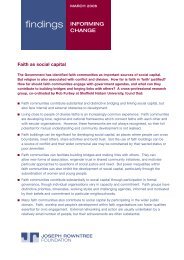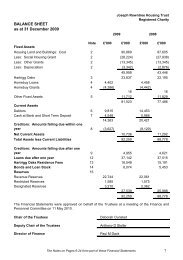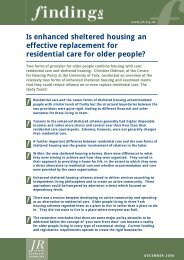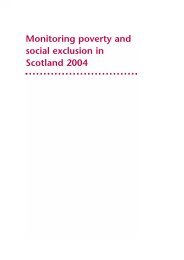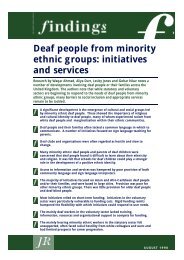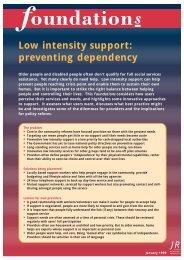Community participation - Joseph Rowntree Foundation
Community participation - Joseph Rowntree Foundation
Community participation - Joseph Rowntree Foundation
Create successful ePaper yourself
Turn your PDF publications into a flip-book with our unique Google optimized e-Paper software.
Understanding the links between <strong>participation</strong> in governance …<br />
Patterns of social capital<br />
The final factor, which, as we will see, proved pivotal in our own fieldwork, is existing<br />
patterns of social capital. At first glance, the evidence from the literature is mixed.<br />
For example, one study found that attitudes to other people, levels of trust in other<br />
people and level of attachment to neighbourhood did not offer convincing<br />
explanations of political <strong>participation</strong>, while others found that people were more likely<br />
to participate if they were involved in associations, 37 or if they felt ‘a sense of<br />
togetherness or shared commitment’. 38<br />
However, this may reflect particular difficulties with measuring social capital as<br />
expressed in attitudes and values using survey research. 39 Where the focus is more<br />
explicitly on social capital as expressed in social networks and connections, the<br />
impact of social capital on <strong>participation</strong> seems more clear-cut. For example, in one<br />
study of participants in governance roles, around 80 per cent were actively recruited<br />
by people they knew. 40 Among women in particular, involvement often depends on<br />
pre-existing networks, perhaps suggesting that new governance structures might<br />
have only a limited impact on non-participants. 41 American research has pointed to<br />
the role that ‘networks of mobilisation and recruitment’ play in shaping political<br />
<strong>participation</strong>. 42 Personal connections among friends, family and acquaintances,<br />
‘often mediated through mutual institutional affiliations’, were crucial. 43<br />
The design of governance arrangements can mitigate or<br />
amplify these factors<br />
The next step in our argument is to understand the ‘mediating’ role that the design of<br />
governance can play in affecting these background factors that shape levels of<br />
<strong>participation</strong>; that is, in what circumstances does governance mitigate the impact of<br />
these factors and in what circumstances does it amplify it?<br />
This role of institutions is seen to be a crucial but neglected aspect of the debate<br />
since:<br />
Social capital either thrives or withers in the context of the institutional<br />
framework that ‘governs who plays, the rules of the game, and<br />
acceptable outcomes’. 44<br />
Institutions in this context include not just formal structures and rules but also<br />
informal cultures, routines and norms: ‘institutions are habits not things’. 45<br />
15



